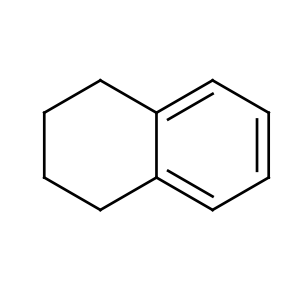Title: Tetralin? (DuPont)
CAS Registry Number: 119-64-2
CAS Name: 1,2,3,4-Tetrahydronaphthalene
Trademarks: Tetranap
Molecular Formula: C10H12
Molecular Weight: 132.20
Percent Composition: C 90.85%, H 9.15%
Literature References: Prepd by catalytic hydrogenation of purified naphthalene. Toxicity study: Smyth
et al., Arch. Ind. Hyg. Occup. Med. 4, 119 (1951).
See ref
under Decalin.
Properties: Liquid. Odor resembling that of a mixture of benzene and menthol. d420 0.9702; d425 0.9662. Volatile with steam; mp -31.0°; bp760 207.2°; bp400 181.8°; bp200 157.2°; bp100 135.3°; bp60 121.3°; bp40 110.4°; bp20 93.8°; bp10 79.0°; bp5 65.3°; bp1.0 38.0°.
nD20 1.54135;
nD25 1.53919. Flash pt, open cup 171°F (77°C), closed cup 180°F (82°C). Insol in water; miscible with ethanol, butanol, acetone, benzene, ether, chloroform, petr ether, Decalin; soluble in methanol: 50.6% w/w. Prolonged, intimate contact with air may cause the formn of tetralin peroxide which may cause explosion of tetralin distn residues. Peroxide formn is prevented by the addn of an antioxidant, such as hydroquinone. LD50 orally in rats: 2.86 g/kg (Smyth).
Melting point: mp -31.0°
Boiling point: bp760 207.2°; bp400 181.8°; bp200 157.2°; bp100 135.3°; bp60 121.3°; bp40 110.4°; bp20 93.8°; bp10 79.0°; bp5 65.3°; bp1.0 38.0°
Flash point: Flash pt, open cup 171°F (77°C), closed cup 180°F (82°C)
Index of refraction: nD20 1.54135;
nD25 1.53919
Density: d420 0.9702; d425 0.9662
Toxicity data: LD50 orally in rats: 2.86 g/kg (Smyth)
CAUTION: Irritating to skin, eyes, mucous membranes, and, in high concns, narcotic. In exptl animals has produced cataracts: E. Browning,
Toxicity and Metabolism of Industrial Solvents (Elsevier, New York, 1965) pp 119-124.
Use: Degreasing agent. Solvent for naphthalene, fats, resins, oils, waxes, used instead of turpentine in lacquers, shoe polishes, floor waxes.

